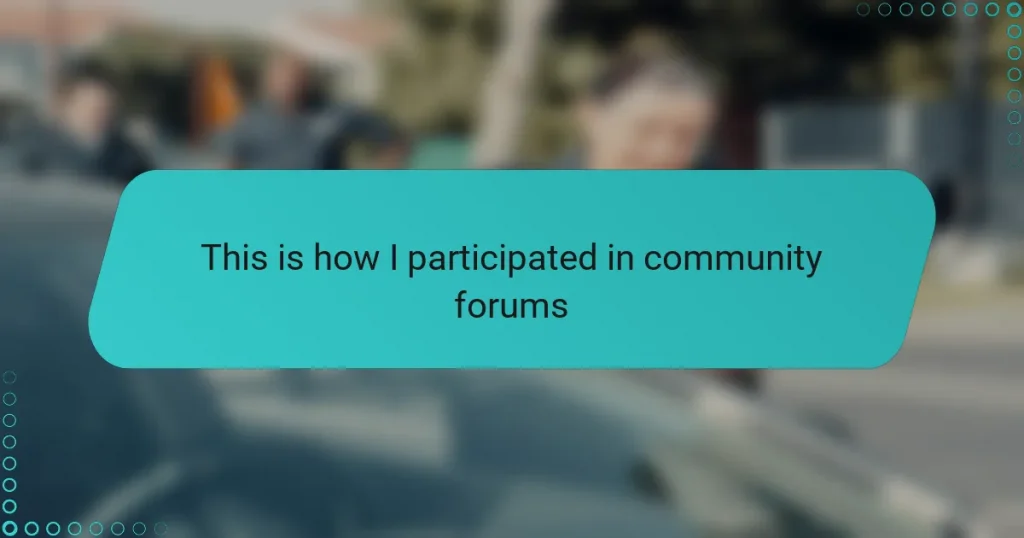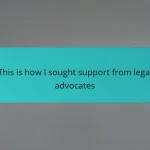Key takeaways
- Legal advocacy involves not just understanding the law but effectively communicating it to empower others, focusing on connection and empathy.
- Community forums serve as vital spaces for exchanging experiences, building confidence, and fostering collective empowerment in advocacy efforts.
- Preparation and clarity in contributions enhance engagement; tailoring language for the audience makes legal discussions more accessible.
- Building connections through forum participation can lead to collaborative efforts, transforming advocacy into a shared journey of trust and support.
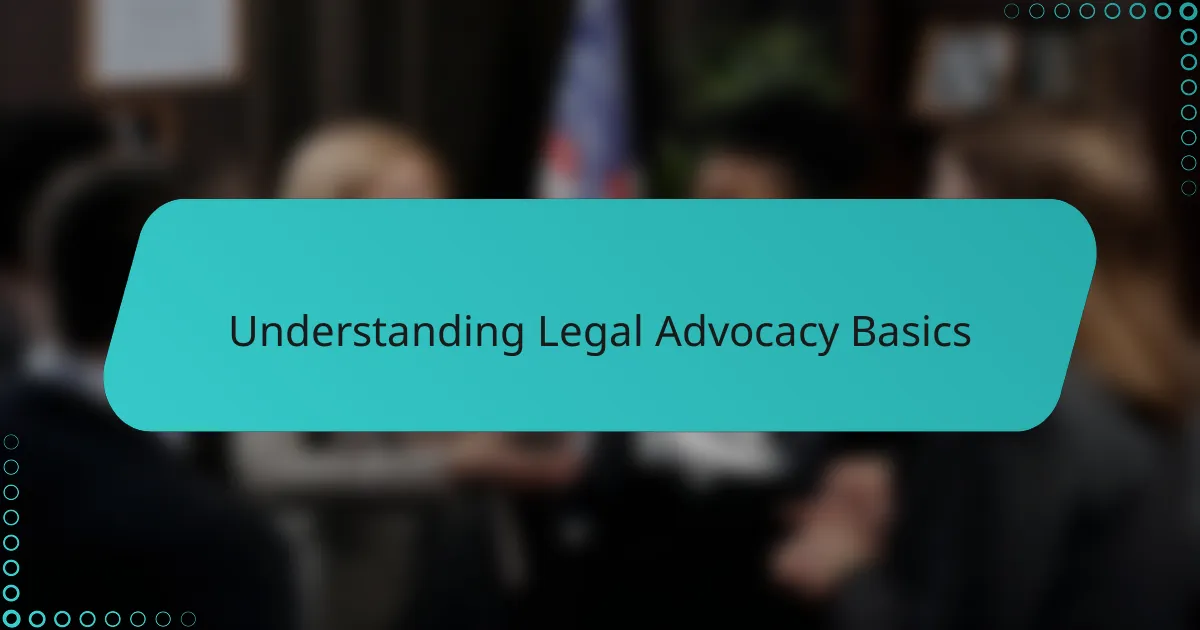
Understanding legal advocacy basics
Legal advocacy, at its core, means standing up for people’s rights within the legal system. When I first engaged with community forums, I realized how powerful understanding the basics was—it helped me see how laws affect everyday lives, not just abstract rules. Have you ever wondered how a simple conversation can transform into a strong legal argument?
One thing that struck me was how advocacy isn’t just about knowing the law; it’s about communicating it in a way that empowers others. I remember feeling a mix of confusion and determination as I learned to break down complex legal jargon into relatable ideas for different communities. This made me appreciate that legal advocacy is as much about connection as it is about knowledge.
Most importantly, legal advocacy hinges on listening carefully before speaking up. In forums I’ve participated in, I found that understanding different perspectives deepened my insight and made my contributions more meaningful. Doesn’t effective advocacy require not just passion, but patience and empathy too?
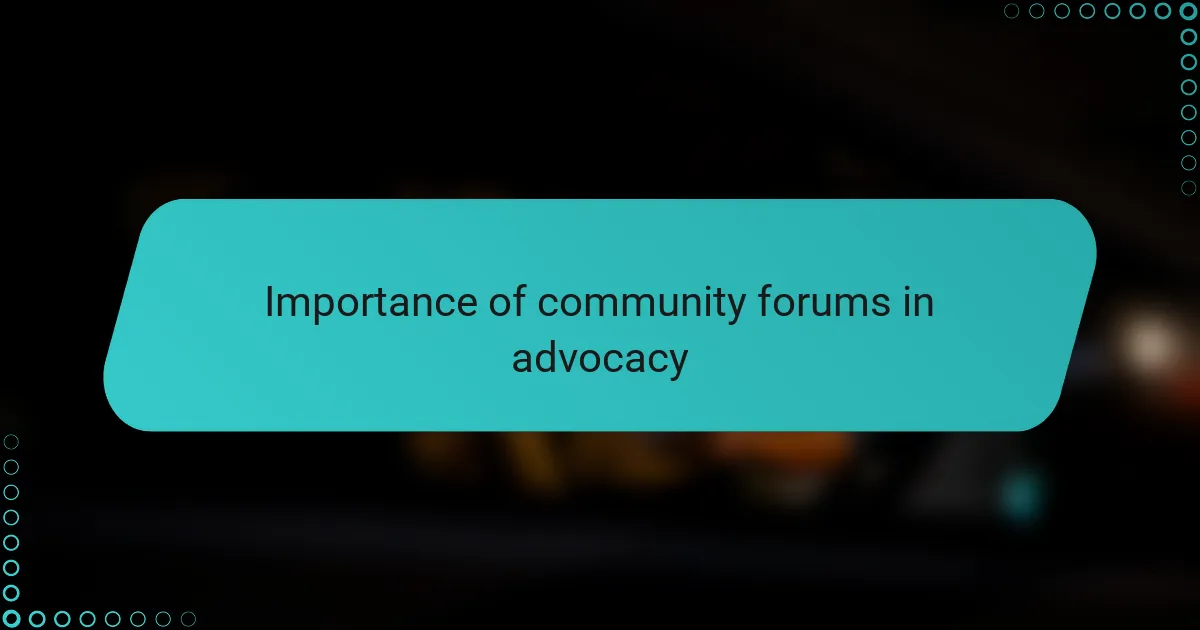
Importance of community forums in advocacy
Community forums became my go-to space for exchanging ideas and experiences with people directly affected by legal issues. I quickly saw how these forums serve as more than just discussion boards—they’re places where voices that often go unheard find strength and solidarity. Have you noticed how sharing a personal story can suddenly make abstract legal concepts feel urgent and real?
What stood out to me was the way community forums create a sense of collective empowerment. When someone posts a question or concern, the flood of supportive responses—sometimes from seasoned advocates, sometimes from peers—builds not just knowledge but confidence. Isn’t it amazing how a network of everyday people can become a formidable force in advocating for change?
Being part of these forums taught me that advocacy is truly a team effort. I recall moments when I felt unsure about an issue, only to gain clarity through others’ insights. These shared moments of learning and encouragement made me realize how essential community forums are—they don’t just inform, they inspire action.
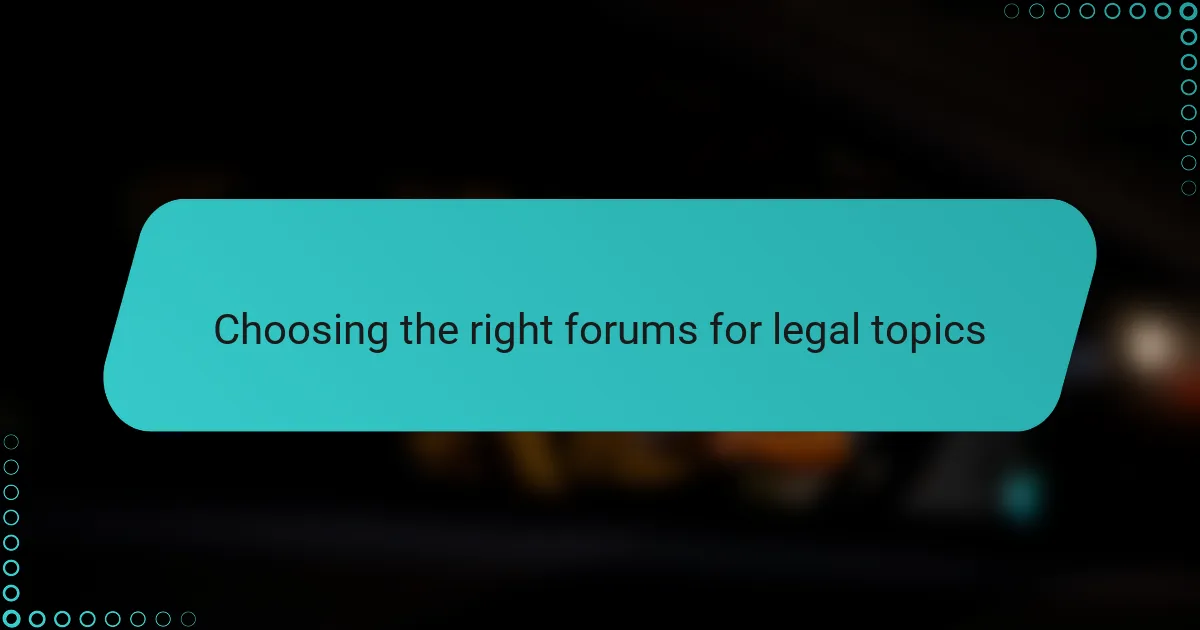
Choosing the right forums for legal topics
Finding the right forum felt like discovering a hidden path in a dense legal forest. I learned to look for spaces where legal topics were not just buzzwords but discussed with care and real-world relevance. Have you ever stumbled upon a forum so focused and respectful that it felt like a safe spot to ask even the simplest questions?
At first, I joined broad forums with countless threads, but it was overwhelming. Narrowing down to specialized legal advocacy forums made a huge difference—these spaces attracted people genuinely committed to justice and change. In those places, the conversations went deeper, and I felt my input mattered more.
I also paid attention to the tone—forums that balanced passion with civility kept me coming back. When discussions welcome different views without turning hostile, it encourages thoughtful dialogue. Have you noticed how respectful exchanges boost your confidence to speak up, even when the topics are tough?
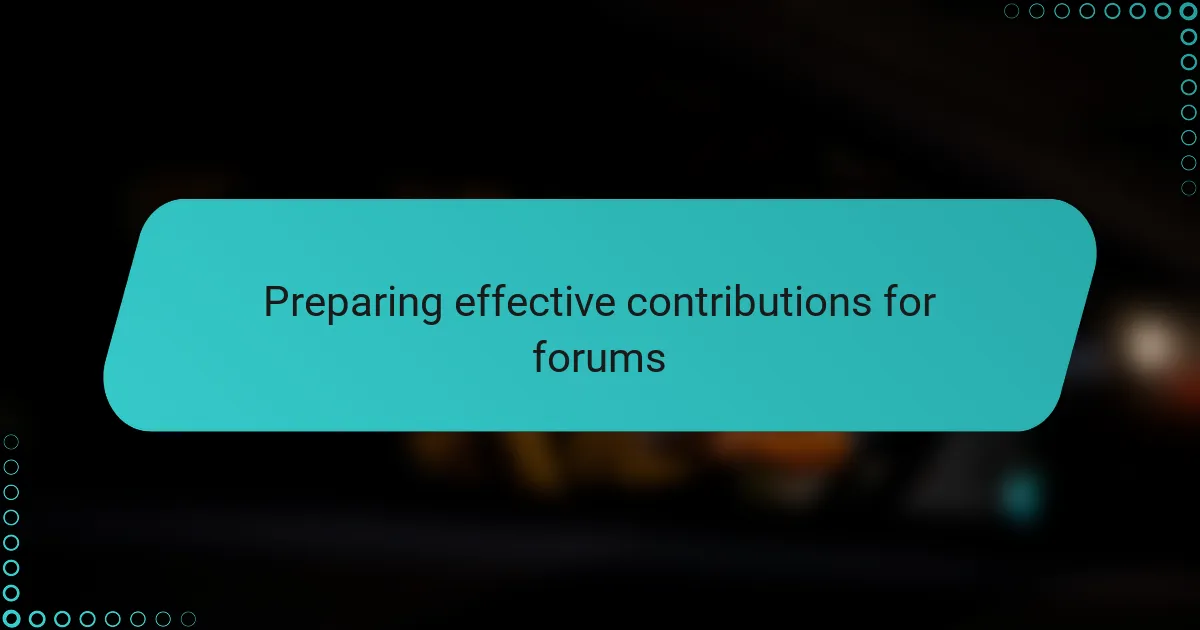
Preparing effective contributions for forums
Preparing my contributions for community forums felt like gearing up for a meaningful conversation rather than just posting online. I realized that clarity was key—I took time to organize my thoughts and backed them up with relevant information. Have you ever noticed how a well-structured point can invite more engagement and respect from others?
I also learned to tailor my language to the audience, avoiding complicated legal terms unless absolutely necessary. Breaking down concepts into simple terms not only made my posts accessible but also helped me deepen my own understanding. Isn’t it satisfying when your words resonate and spark helpful discussions?
Before hitting “submit,” I paused to reflect—was I addressing the real concern? Did my contribution add value or just noise? This habit sharpened my focus and made my participation feel purposeful. In those moments, I felt I was doing more than sharing opinions; I was building bridges within the community.
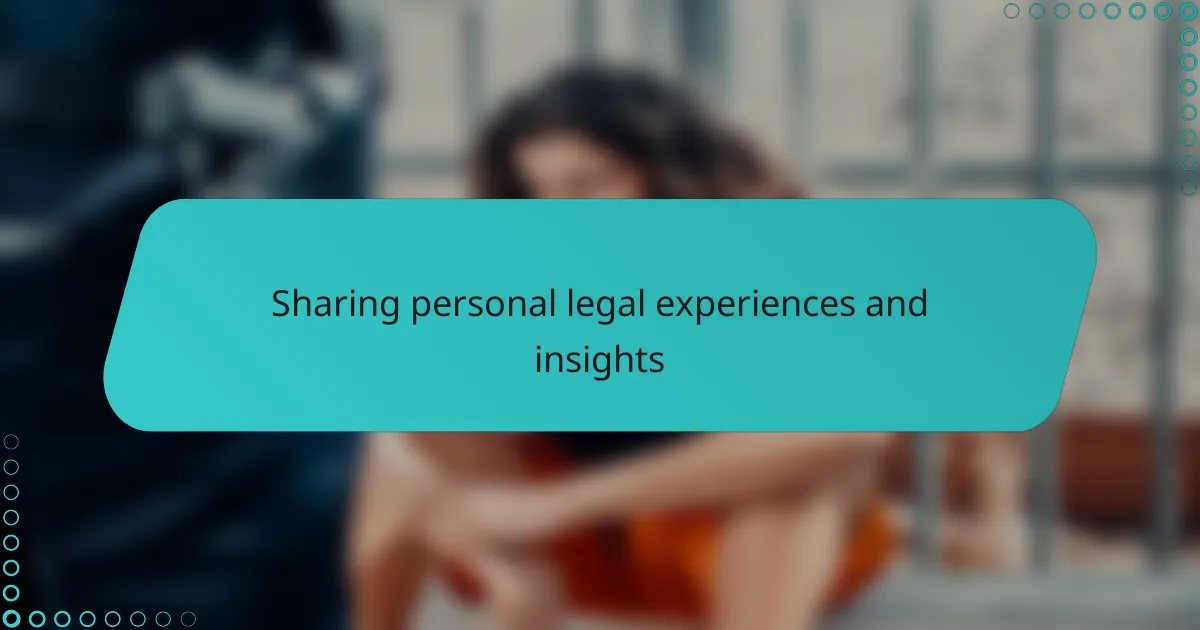
Sharing personal legal experiences and insights
When I first started sharing my own legal experiences in forums, I discovered how powerful vulnerability can be. Opening up about a difficult case I faced didn’t just help me process it—it invited others to share their stories too. Have you ever noticed how personal stories suddenly make legal issues feel less abstract and more human?
I remember one particular thread where I described the challenges I encountered navigating tenant rights. The responses I received were incredible; people offered advice, shared resources, and welcomed my input with genuine empathy. That exchange taught me that sharing personal insights doesn’t just inform—it creates a supportive legal community.
Of course, sharing personal experiences also means being mindful about privacy and accuracy. I always try to balance honesty with discretion, ensuring my contributions respect all parties involved. Does that cautiousness sometimes slow me down? Sure, but it also makes my participation trustworthy and meaningful.
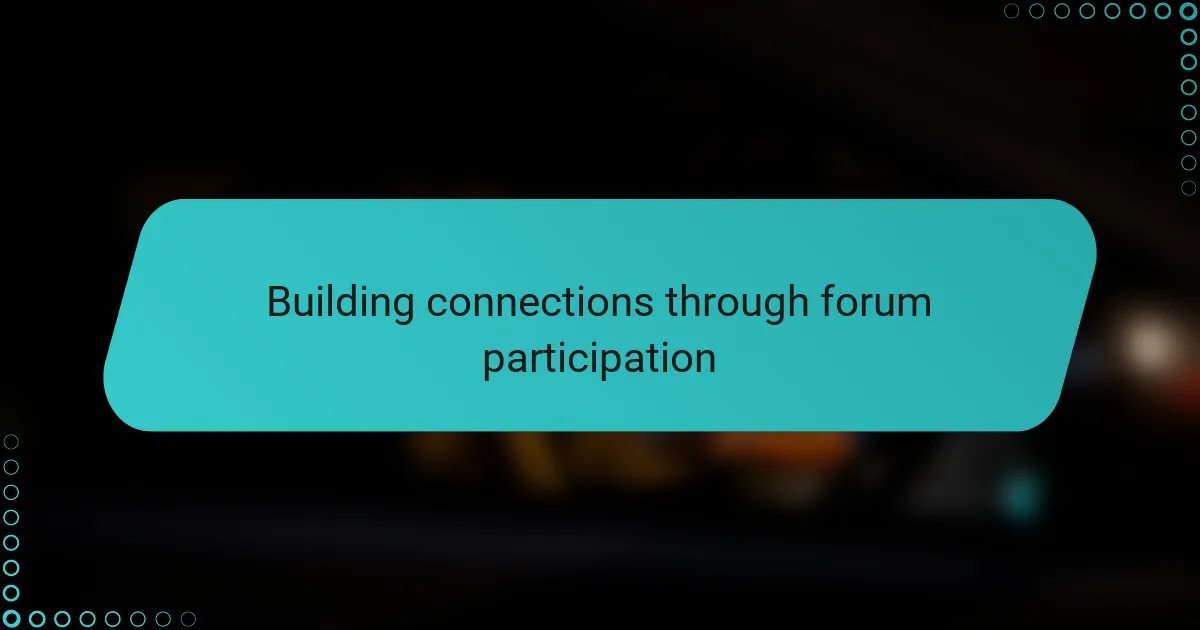
Building connections through forum participation
Building connections through forum participation felt like slowly weaving a web of trust and shared purpose. Each time I responded to someone’s question or related to their experience, I sensed a genuine exchange that went beyond typing words on a screen. Have you ever felt that spark when you realize your input actually helped someone see a legal issue in a new light?
What surprised me most was how these connections grew into ongoing conversations and, eventually, collaborations. I recall a moment when a casual forum chat turned into working together on a community petition—it made me appreciate how forums aren’t just about advice, but about forming real partnerships. Doesn’t that kind of connection make legal advocacy feel less like a solo challenge and more like a collective journey?
The emotional impact of these connections can’t be overstated. Knowing that behind every username there’s a person eager for support made my contributions feel more meaningful. I often found myself returning not just to share knowledge but to nurture relationships—because advocacy, after all, thrives on trust and commitment between people.
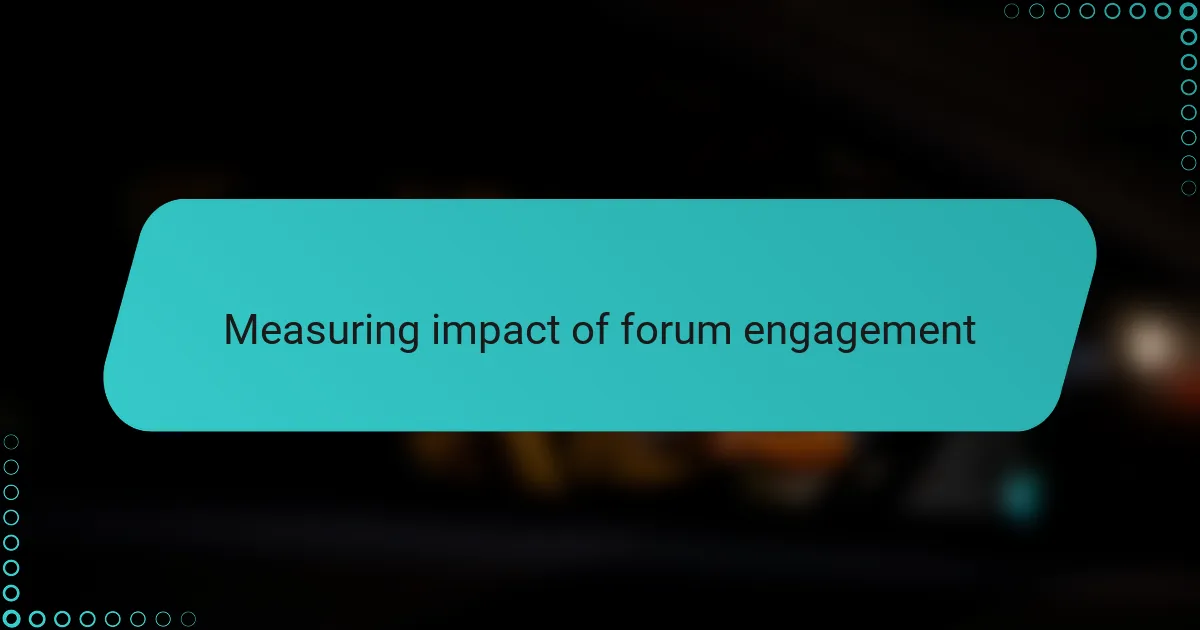
Measuring impact of forum engagement
Measuring the impact of my forum engagement wasn’t always straightforward. At first, I looked for tangible signs like the number of replies or likes on my posts, thinking these were clear indicators of influence. But over time, I realized that real impact often hides in quieter moments—when someone messages me privately to thank me or when a discussion I helped start sparks a deeper, ongoing conversation.
Sometimes, I asked myself, how do you truly know if your words made a difference? From my experience, it’s in the subtle shifts—when a forum member expresses newfound confidence, or when legal jargon turns into accessible advice that empowers someone to take action. Those instances felt like small victories, reminding me that impact isn’t just measured by numbers but by meaningful change in understanding and motivation.
Reflecting on these experiences taught me to value both qualitative and quantitative feedback. While metrics can hint at reach, genuine impact thrives in connection and trust built over time. Isn’t it fascinating how a few thoughtful contributions can ripple through a community, gradually transforming awareness into advocacy?
